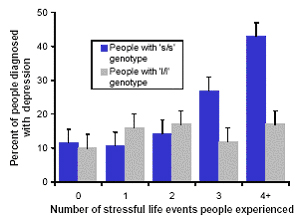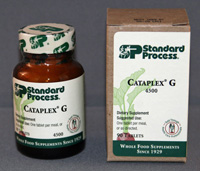
|
The Relationship of Genes & Stress Becomes ClearUnderstanding the ImplicationsThe stressful life events led to onset of new depression among people with one or two copies of the short gene variant who didn't have depression before the events happened. The events failed to predict a diagnosis of new depression among those with two copies of the long variant. Among those who had experienced multiple stressful events, 11 percent with the short variant thought about or attempted suicide, compared to 4 percent with two copies of the long variant. These self-reports were corroborated by reports from participants' loved ones. The researchers suggest that effects of genes in complex disorders like psychiatric illnesses are most likely to be uncovered when such life stresses are measured, since a gene's effects may only be expressed, or turned on, in people exposed to the requisite environmental risks. Also participating in the study were: Karen Sugden, Alan Taylor, Dr. Ian Craig, Joseph McClay, Jonathan Mill, King's College London; Dr. Honalee Harrington, University of Wisconsin; Judy Martin, Dr. Richie Poulton, Dunedin School of Medicine; Dr. Antony Braithwaite, University of Otago. 
Among people who had inherited two copies of the stress-sensitive short version of the serotonin transporter gene (s/s), 43 percent developed depression following four stressful life events in their early twenties, compared to 17 percent among people with two copies of the stress-protective long version (l/l). About 17 percent of the 847 subjects carried two copies of the short version, 31 percent two copies of the long version, and 51 percent one copy of each version. Previous: How the Gene was Found Adapted from: Gene More Than Doubles Risk Of Depression Following Life Stresses
|
|
||||||||||||||||||
|


